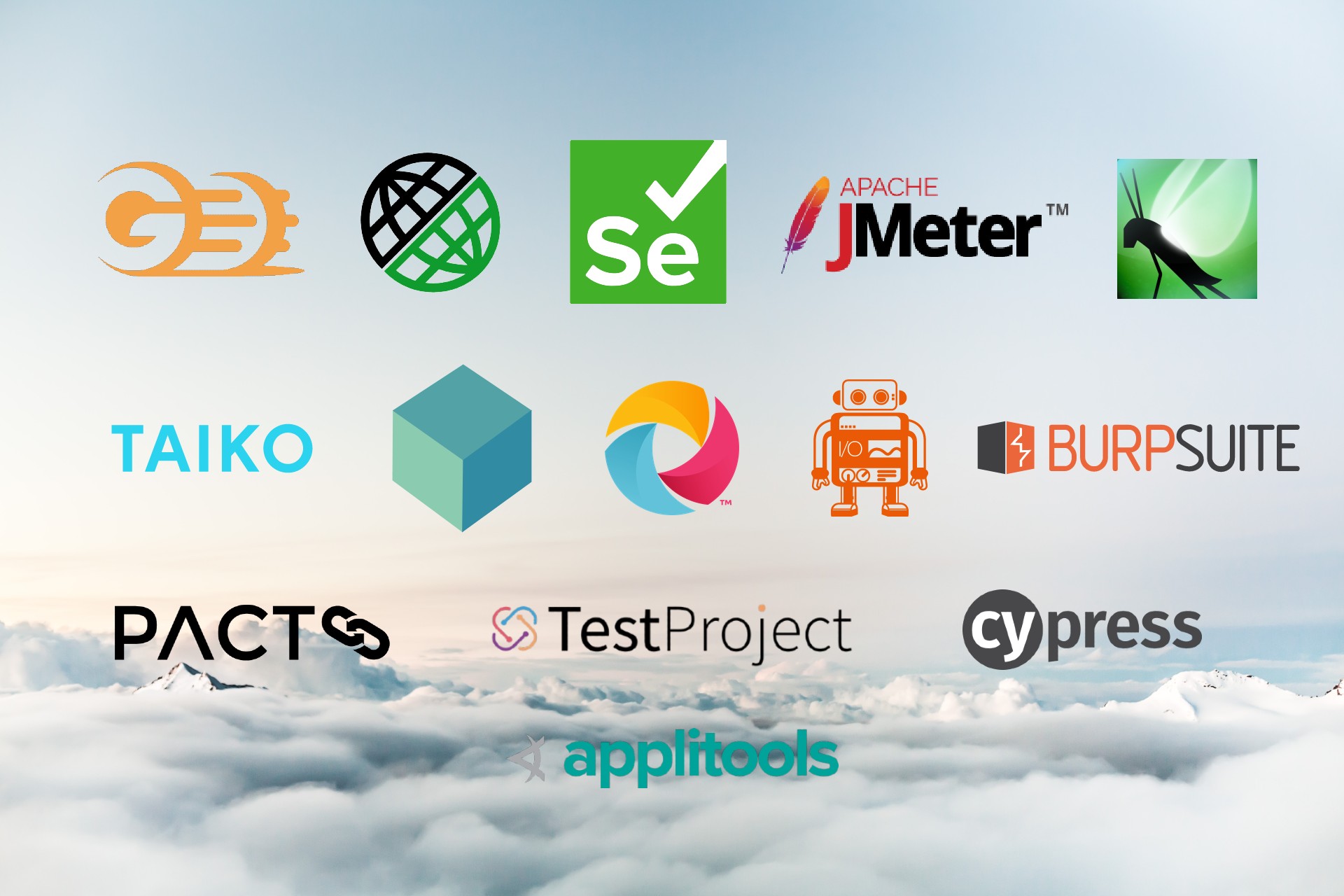20 Testing Tools and Libraries You Need to Know
This list of testing tools and libraries includes some that will be useful for automated testing, unit testing, and a variety of other testing needs.
Join the DZone community and get the full member experience.
Join For Free
Demand for delivering better quality software products faster makes organizations search for test automation tools to meet their needs in continuous integrations and DevOps methodologies. These test automation tools act as an enabler for automation in teams during their successful DevOps or Agile adoption.
Here is a comprehensive list of 20 test automation tools you can research and finalize the best fit for your project.
Selenium
Selenium composes three tools.
WebDriver drives a browser natively, as a user would, either locally or on a remote machine using the Selenium server, marks a leap forward in terms of browser automation.
Selenium WebDriver is a W3C Recommendation.
Selenium Grid is a smart proxy server that allows Selenium tests to route commands to remote web browser instances. It aims to provide an easy way to run tests in parallel on multiple machines.
Selenium IDE is an open-source record and playback test automation for the web.
License: Open Source
![]() Appium
Appium
Appium is an open-source, cross-platform test automation tool for native, hybrid, and mobile web and desktop apps. Appium support simulators (iOS), emulators (Android), and real devices (iOS, Android, Windows, and Mac).
Appium 2.0 is built in such a way that anyone can create and publish a driver. No drivers are included with Appium by default. Drivers maintain their versioning unrelated to Appium versioning. Also proposed is a plugin-based ecosystem where any plugin can be arbitrarily added functionality before or after the actual Appium commands. One of the leads were showcased by Jonathan in AppiumConf is the Raspberry Pi driver.
License: Open Source
![]() Taiko
Taiko
Taiko is a free and open-source browser automation tool built by the team behind Gauge from ThoughtWorks. Taiko is a Node.js library with a clear and concise API to automate Chromium-based browsers(Chrome, Microsoft Edge, Opera). Tests written in Taiko are highly readable and maintainable.
Taiko features can be extended via plugins which can allow users to take more advantage of ChromeDevtoolsProtocol when core Taiko concentrating on functionalities around UI automation tests. Some of its plugins are,
Taiko-accessibility - A plugin to test the site accessibility with Taiko.
Taiko-android - A plugin to run web tests on android devices and emulators using Taiko.
Taiko-diagnostics - A plugin for taiko which provides some diagnostics features like measuring speed index, performance metrics of the webpage.
License: Open Source
TestProject
TestProject is a free end-to-end test automation platform for web, mobile, and API testing that’s supported by the test automation community. TestProject is built on open source tools like Selenium and Appium. It’s an end-to-end test automation platform with community provided add-ons for easy scripting, collaborative test scripting, smart test recorder, etc.
TestProject is a powerful and fully-featured product that anyone can use for free. TestProject isn’t open source but heavily driven by the community behind. Another cool thing about TestProject is that it easily supports so many platforms like Windows, macOS, Linux, iOS, Android, Webservices.
Some of the nice features include screen mirroring of iOS and Android devices, an element inspector and explorer, reporting dashboard and smart test recorder. Some of the add-ons built by the community using TestProject SDK are NLP engine, RESTful client, Android Permission Manager, and more can be used in the form of browser recorder or in test classes directly.
License: Free

WebdriverIO
WebdriverIO is a JavaScript-based test automation framework that allows you to run tests based on the Webdriver protocol and Appium automation technology. It provides support for your favorite BDD/TDD test framework and will run your tests locally or in the cloud using Sauce Labs, BrowserStack or TestingBot.
WebdriverIO is a widely used test automation framework quite popular among developers and testers. Some of its services include,
@wdio/appium-service — A WebdriverIO service to start & stop Appium server
@wdio/applitools-service — A WebdriverIO service for visual regression testing using Applitools
@wdio/devtools-service — A WebdriverIO service that allows you to run Chrome DevTools commands in your tests
@wdio/firefox-profile-service — A WebdriverIO service that lets you define your Firefox profile in your wdio.conf.js
License: Open Source
![]() Applitools
Applitools
Applitools is an application visual management and AI-powered visual UI testing and monitoring software. Applitools automatically run functional and visual tests at scale across every app, browser, OS, and screen size.
Some of the Applitools features include leveraging existing tests, AI-powered cognitive vision, automating test maintenance, cross-device and browser tests, visual test management, and analytics.
Applitools blog on A/B testing of application is quite popular. Recently Applitools introduced the Ultrafast Grid for massively parallel, cross-browser multiple viewport testing.
Pricing plans are available here.
![]() Cypress
Cypress
Cypress is a next-generation front-end testing tool built for the modern web. Cypress enables writing unit, end to end, and integration tests. Cypress is executed in the same run loop as your application. Cypress is a node server process where both constantly communicate, synchronize, and perform tasks on behalf of each other. Supported test frameworks are limited. Often debugging tests are quite difficult. Some other challenges include moving between different origins or domains in the same test, cross-origin iframes aren’t possible. There are workarounds suggested by the cypress dev team in the documentation.
Cypress testing library is another interesting testing library with simple and complete custom Cypress commands and utilities that encourage good testing practices.
License: Open Source
![]() Pact
Pact
Pact is a code-first tool for testing HTTP and message integrations using contract tests. Using Pact, we can define consumer expectations for a given provider (that can be an HTTP REST service) in the form of a contract (hence, the name of the library).
Consumer-driven contract is a pattern that drives the development of the provider from its consumer’s point of view. Pact is a testing tool that guarantees those contracts are satisfied.
License: Open Source
![]() REST-assured
REST-assured
REST-assured is a Java DSL for simplifying testing of REST-based services built on top of HTTP Builder. It supports POST, GET, PUT, DELETE, OPTIONS, PATCH, and HEAD requests and can be used to validate and verify the response of these requests.
REST-assured was designed to simplify the testing and validation of REST APIs and is highly influenced by testing techniques used in dynamic languages such as Ruby and Groovy.
The library has solid support for HTTP, starting with the verbs and standard HTTP operations, but also going well beyond these basics.
License: Open Source
![]() OWASP ZAP
OWASP ZAP
OWASP ZAP is an open-source web application security scanner. It is intended to be used by both those new to application security as well as professional penetration testers. It is one of the most active open web application security project projects and has been given Flagship status.
At its core, ZAP is what is known as a “man-in-the-middle proxy.” It stands between the tester’s browser and the web application so that it can intercept and inspect messages sent between the browser and web application, modify the contents if needed, and then forward those packets on to the destination. It can be used as a stand-alone application, and as a daemon process.
ZAP provides functionality for a range of skill levels – from developers to testers new to security testing, to security testing specialists. ZAP has versions for each major OS and Docker, so you are not tied to a single OS.
License: Open Source
![]() JMeter
JMeter
Apache JMeter is open-source software, a 100% pure Java application designed to load test functional behavior and measure performance. It was originally designed for testing web applications but has since expanded to other test functions.
Apache JMeter features include:
The ability to load and performance test many different applications/server/protocol types
Full-featured Test IDE that allows fast Test Plan recording (from Browsers or native applications), building and debugging.
The full multithreading framework allows concurrent sampling by many threads and simultaneous sampling of different functions by separate thread groups.
Caching and offline analysis/replaying of test results.
Easy correlation through the ability to extract data from most popular response formats, HTML, JSON, XML or any textual format.
License: Open Source
Gatling
Gatling is an open-source load and performance testing framework based on Scala, Akka, and Netty. It officially supports HTTP, WebSocket, Server-Sent-Events, and JMS.
Gatling doesn’t allocate a separate thread for each user. Instead, all multithreading is done via messages between actors (universal primitives of concurrent computation), which allow simulating a list of users by using just one thread.
Gatling has assertions and human-readable tests. It also provides a detailed metrics dashboard out of the box.
Gatling with Taurus gives us configurable test execution and detailed real-time online reporting.
License: Both open source and enterprise versions are available.
Terratest
Terratest is a Go library that provides patterns and helper functions for testing infrastructure, with first-class support for Terraform, Packer, Docker, Kubernetes, AWS, GCP, and more. It provides a variety of helper functions and patterns for common infrastructure testing tasks, including:
Testing Terraform code
Testing Packer templates
Testing Docker images
Executing commands on servers over SSH
Working with AWS, Azure, GCP, and Kubernetes APIs
Testing Helm Charts
Making HTTP requests
Running shell commands, etc
Axe-Core
Axe is an accessibility testing engine for websites and other HTML-based user interfaces. It's fast, secure, lightweight, and was built to seamlessly integrate with any existing test environment so you can automate accessibility testing alongside your regular functional testing.
With Axe, accessibility can be performed as part of unit testing, integration testing and functional testing on any modern browsers, tools and testing environments that developers can use.
It integrates seamlessly with existing functional or acceptance tests. It automatically determines which rules to run based on the evaluation context. Axe supports in-memory fixtures, static fixtures, integration tests and iframes of infinite depth and it is highly configurable.
License: Open Source
![]() Testcontainers
Testcontainers
Testcontainers is a Java library that supports JUnit tests, providing lightweight, throwaway instances of common databases, Selenium web browsers, or anything else that can run in a Docker container.
Testcontainers makes data access layer integration tests, application integration tests, and UI/acceptance tests easier.
License: Open Source
![]() Jest
Jest
Jest is a delightful JavaScript Testing Framework with a focus on simplicity. Jest helps in performing snapshot testing to detect any unexpected changes in UI. Instead of storing the image screenshots of UI and performing image comparisons, Jest stores a version of the standard output of a rendered React components under test in a snapshot file.
Snapshot files are committed along with the unit tests and are used by the testing framework to compare against rendered component output in future test runs. If the test fails then Jest shows the difference between the expected result and actual outputs.
License: Open Source
![]() Locust
Locust
Locust is a Scalable user load testing tool written in Python. Locust is an easy-to-use, distributed, user load testing tool. It is intended for load-testing web sites (or other systems) and figuring out how many concurrent users a system can handle.
The idea is that during a test, a swarm of locusts will attack your website. The behavior of each locust (or test user, if you will) is defined by you and the swarming process is monitored from a web UI in real-time. This will help you battle test and identify bottlenecks in your code before letting real users in. Some of the features include test distribution and scalability, a lightweight process that doesn’t use callbacks like other tools in the market, the dedicated web server on the flask to publish test results, etc.
License: Open Source
Pywinauto
pywinauto is a powerful Python module to automate windows GUI applications. It allows you to send mouse and keyboard events to windows dialogs and controls. By this time, we all might have remembered the Sikuli or Appium’s windows driver but pywinauto is much more powerful and has a strong community behind it and one of the actively maintained modules as well.
pywinauto can flexibly wait for a dialog initialization implicitly (with the default timeout) or explicitly using dedicated methods/functions that could help you to make your code easier and more reliable.
License: Open Source
![]() Burp Suite
Burp Suite
Burp Suite is an integrated platform for performing security testing of web applications. Its various tools work seamlessly together to support the entire testing process, from initial mapping and analysis of an application's attack surface, through to finding and exploiting security vulnerabilities.
Some of the Burp Suite features include target site-map functionality, crawling a web application using a spider, manipulating web requests, and decoding and encoding of data.
License: Open Source and Pro/Commercial Version
GTXiLib
GTXiLib is a Google Toolbox for Accessibility for iOS or GTX-eye is a framework for iOS accessibility testing. It seamlessly integrates with XCTest based frameworks like EarlGrey. Existing XCTests wrote can be integrated into GTXiLib to perform accessibility checks without any major code changes. It performs accessibility checks based on the presence of accessibility labels on the elements on the screen.
GTXiLib can be installed onto a single test case, test class or a specific subset of tests giving you the freedom to add accessibility testing incrementally. This helps in driving accessibility adoption on large scale projects incrementally.
GTXiLib has a simple API to create custom checks based on the specific needs of your app.
License: Open Source
These are also a lot of otheramazing testing tools in the world. The choice of automation testing tool depends on various factors, but I'm hopeful the above list will surely help you while making the selection.
Further Reading
Top 10 Automated Software Testing Tools
Opinions expressed by DZone contributors are their own.

 Appium
Appium Taiko
Taiko Applitools
Applitools Cypress
Cypress Pact
Pact REST-assured
REST-assured OWASP ZAP
OWASP ZAP JMeter
JMeter Testcontainers
Testcontainers Jest
Jest Locust
Locust
Comments